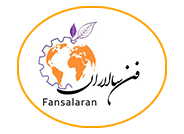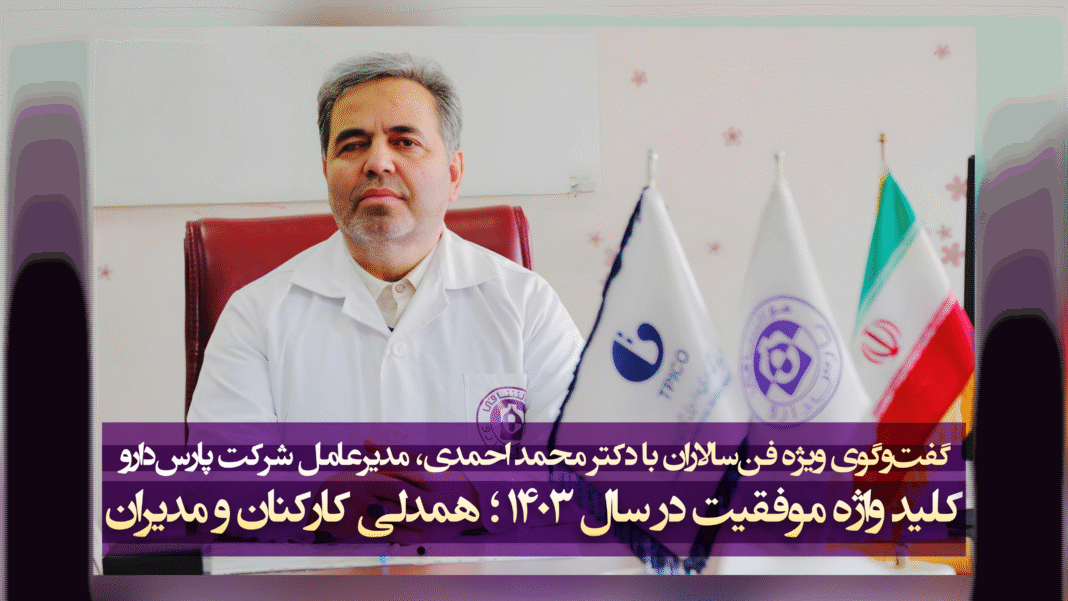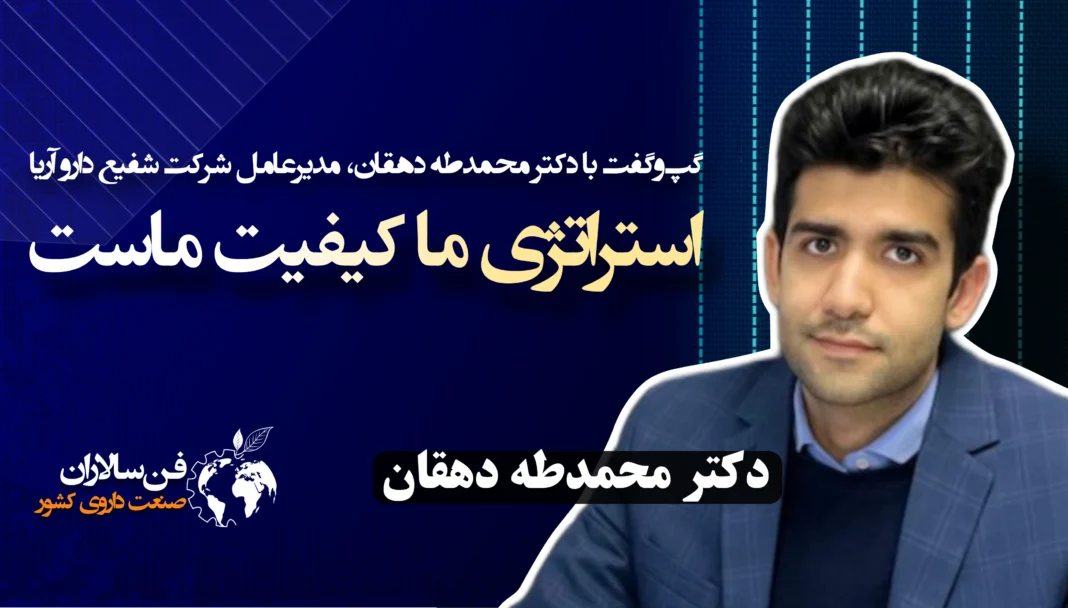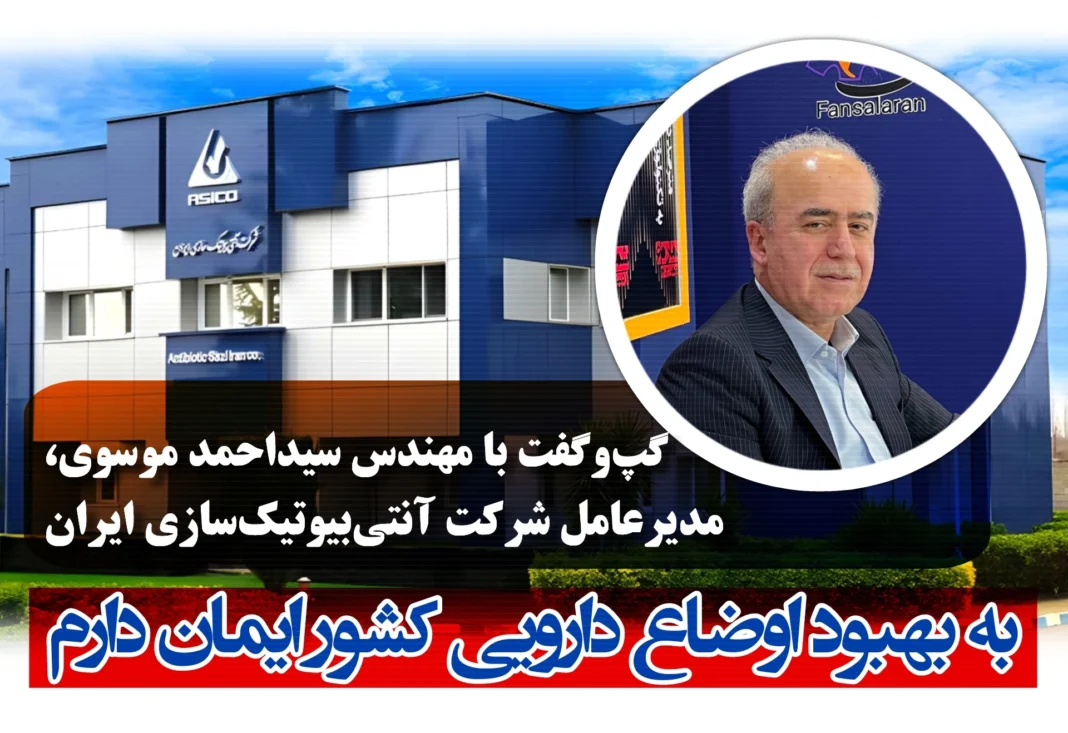A Special Interview with Dr. Mohammad Ahmadi, CEO of Pars Darou
Intro: Interviewing a figure who has spent more than a decade safeguarding the assets of Iran’s Social Security Organization and its affiliated economic enterprises—now leading one of the country’s oldest and most reputable pharmaceutical brands—is bound to offer a different kind of perspective. Dr. Mohammad Ahmadi is not media-oriented and rarely accepts interviews.
However, in this conversation, we witnessed nothing but sincerity and humility. Open and receptive, he patiently detailed each of his strategic steps, from reforming the product portfolio and launching the cephalosporin site to securing GMP for solid dosage forms, revitalizing exports, acquiring 21 new product licenses, and implementing smart procurement policies.
Dr. Mohammad Ahmadi: I studied medicine at Isfahan University of Medical Sciences. Later, I engaged in executive roles within the Ministry of Health, including hospital construction and equipment projects. I served on the boards of pharmaceutical companies like Shahid Ghazi and Sobhan Holding, and proudly spent 12 years in security and oversight departments of the Social Security Organization. Even in those roles, my philosophy was support-oriented, not fault-finding.
Before joining Pars Darou on February 18, 2024, I had closely observed the pharma industry due to my medical background. When offered the executive role, I accepted it after thorough research. Pars Darou is a prestigious company—both in its product line and its dedicated staff—and in many ways operates like a holding company.
A Company on the Brink of Crisis: According to a TPPH report last year, Pars Darou was listed among six companies on the brink of crisis. Out of 151 licenses, only around 80 were active, and most lacked the raw materials needed for production, primarily due to industry-wide liquidity issues. Some vital medications—like Nystatin, Mupirocin ointment, Dalavag C, and Phenobarbital—were not produced due to forex allocation failures. Even Spironolactone, which relies on domestic raw materials, was out of production.
Further complicating matters, the company lacked an active board of directors, and its legal board members (Razak and Daroupakhsh) had banking issues that affected us. We had no checkbook for months after I joined.
Step One: Reforming the Product Portfolio Our immediate priority was to diversify the product portfolio. In 2023, over 38% of our revenue came from aspirin alone. Combined inventory in warehouses and distributors exceeded 9 million boxes—enough for nearly 10 months. We were forced to offer heavy discounts.
We held joint meetings with all departments and identified 23 high-demand, high-margin products with the help of market data and distributor input. These became our new focus.
Fast Production Wins: We prioritized products with domestic raw materials. Spironolactone was the first; we sourced the API in under a week and released the final product before year-end. Metronidazole vaginal tablets, which we uniquely produce, also entered production after rapid procurement and tool adjustments.
From Being Managed by Systems to Managing the System: When raw materials arrived, we discovered a lack of proper tablet dies. We ordered and received them quickly, emphasizing our shift from reactive to proactive management.
Profit Distribution Hampering Industry: In previous years, many Shasta-affiliated companies distributed 90% of their profits, which weakened infrastructure investment. Thankfully, this year the payout was reduced to 70%.
Expanding Distribution Partnerships: By mid-year, we had resumed production of nearly our full range—except Dalavag C—and added five new distribution partners.
From Oversupply to Demand-Driven Production: A year’s worth of aspirin surplus was reduced to under two months. We moved from one production shift to two, with workers even requesting fewer overtime hours due to increased workload.
Solving Water Supply Issues in Semi-Solids Line: Semi-solids were at 50% capacity due to purified water shortages. We partnered with a domestic tech firm that delivered a new water system—twice the previous capacity—on credit.
GMP for Solid Dosage Line Achieved: We earned GMP certification for solids this year—a key milestone for exports. In semi-solids, we are rebuilding a 350 sqm site, which will be ready soon.
Reviving the Cephalosporin Site: Closed since 2019 due to GMP issues, the cephalosporin site was fully demolished and rebuilt with internal resources. It took just 10 days to demolish, freeing up 100 sqm of space. Construction and procurement ran in parallel, completing in under five months at a 30 billion toman cost-saving.
Exports and Budget Performance: Exports reached over $1 million in 2024, doubling our target. The company also achieved 95% of its 1.75 trillion toman budget, with full completion expected by year-end.
Shortened Procurement Cycles: We reduced purchase cycles to six months, allowing more diverse product investments. Despite a 4-trillion toman portfolio, our registered capital is just 95 billion—prompting two capital increases, one already in final approval.
Acquiring 9 Deeds for Company Land: From a fragmented land ownership record across 10 deeds, we consolidated and secured 9 official title deeds, covering 24,000 sqm.
21 New Product Licenses in 2024: Focusing on R&D, we reviewed pending licenses and prioritized economically viable options. We obtained 21 new licenses, including 3 first-in-country products.
Launching Benzoyl Peroxide Gel (PenoXide): This will be Iran’s first domestically produced benzoyl peroxide gel—acne’s first-line treatment. We’ve invested heavily in packaging and marketing, aiming to make it “the next Aspirin.”
Lab Upgrades and Cost-Saving Procurement: We acquired 5 HPLC machines for lab accreditation—long overdue. Other equipment like filling, water systems, and tablet tooling was also procured. Our updated procurement policy saved over 80 billion tomans.
Reviving Legacy Products and Optimizing Supplements: We’ve revitalized top supplements like Magnacoin and OsteoPars. Aspirin 81 is back in production after a two-year hiatus. Rosuvastatin, with three licenses, is also returning.
Ranking and Field Leadership: Pars Darou now ranks 3rd in TPPH for product sales and 2nd in budget fulfillment. I believe in field-based management and often visit operational units directly.
2025 Will Be Pars Darou’s Year: With no new major construction in 2025 and all infrastructure challenges addressed, we expect full GMP certification across all lines—and a transformative year for Pars Darou.






